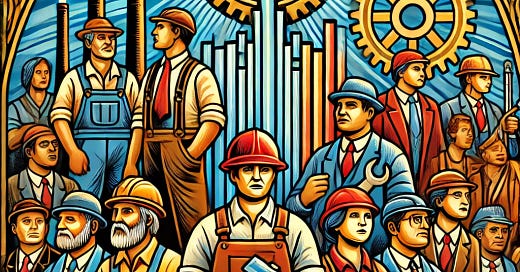Faith and Labor
“Faith and Labor Unions”, created by DALL-E on ChatGPT
For over 60 years, I’ve been a person of faith, and for more than 50 years, a union member. These two crucial aspects of my life are deeply interconnected.
In the past, there was a group known as Labor Priests—clergy who stood up for workers and their unions during tough times (which has been my entire working life). While some priests marched with picket signs, many engaged employers, supported union members, and prayed with workers needing spiritual uplift.
I experienced this firsthand in 1986 when I, along with 900 Metal Trade workers, was locked out of a shipyard in Seattle. Priests and ministers became the moral voice of the community, holding a press conference to condemn the employer’s actions and urging a return to negotiations. One priest even held a Mass for the workers, offering God’s gift to all who wanted it. Their support showed us that leaders in the faith community saw our struggles, heard our pleas, and stood ready to help. Unfortunately, no resolution came, and the shipyard closed the following year, never to reopen.
I’ve seen clergy step in when workers face injustice, even within the church itself. For example, when workers at the Sisters of Providence hospital in Yakima, Washington, tried to organize, a local retired priest spoke out on their behalf, urging the hospital to recognize their healthcare union.
These actions aren’t faith leaders rushing into labor struggles, but rather workers reaching out to their faith communities. Many union members are also members of faith communities—the person sitting next to you in church, synagogue, or mosque could be a union member.
The Pacific Northwest has numerous examples of faith and labor working together, but perhaps the most significant was during the World Trade Organization (WTO) event in
Seattle in 1999. Not the large march and rally on November 30th, but the evening before, on November 29th.
While WTO delegates attended a lavish reception sponsored by corporate organizations, including Boeing, at the Stadium Exhibition Center, the Washington Association of Churches organized a response. The year 2000 had been declared a Jubilee Year by faith communities worldwide, calling on leaders to cancel the debts of poor countries to international banks. An estimated 10,000 people of faith and labor formed a human chain around the Exhibition Center, despite the dark, cold, and rainy Seattle night. It was a powerful sight.
Many downtown Seattle faith communities held events in support of the Jubilee action and discussions on WTO’s impact on the environment, civil society, and workers worldwide. The next day, 30-40 thousand trade unionists, people of faith, and environmental supporters marched through Seattle, demanding better protections for civil society, the environment, and workers. These events strengthened the relationship between faith and labor in the Pacific Northwest, a bond that remains strong today.
In 2003, the Hotel Employees and Restaurant Employees Union (HERE), the AFL-CIO, immigrant rights organizations, and community groups organized the Immigrant Worker Freedom Ride. Nine hundred immigrants traveled from Seattle to Washington, D.C., and then to a rally at Flushing Meadows, NY. I helped organize events for the buses traveling from Seattle to New York, with many of these actions coordinated by local faith or labor communities. This coalition understood the struggles immigrants face, whether documented or not.
Although retired, I’m still active in the labor-faith coalition. My wife and I are ship visitors for the Seattle Seafarers Center, a coalition of Episcopal, Catholic, and Lutheran faiths. We visit freighters and container ships at the Port of Everett, delivering goods, SIM cards, magazines, prayer booklets, rosaries, and sometimes treats. During Christmas, we bring gifts for the crews. If the crew desires a mass or service, we arrange for a local priest or deacon. A crucial part of our role is ensuring the crew’s welfare. If we suspect mistreatment, we report it to the Seafarers Center and the local International Transportation Federation (ITF) inspector, who then investigates and addresses any issues.
While labor and faith don’t always agree, we share much more in common. Together, we can make a tremendous difference in people’s lives. My faith community is St. Aidan’s Episcopal Church, but for some union members, their union is their faith community—and who can blame them?
Blessings and Solidarity
Rob Gorman has lived in the US since 1974. He served an apprenticeship as a construction electrician in Scotland and worked in a number of countries before settling in the Pacific Northwest. He has been a union member since he was eighteen years old, and, though retired, Rob is still a member of the International Brotherhood of Electrical Workers (IBEW) Local 46 in Seattle, Washington. Rob is married to his one time apprentice, Karole, his wife of forty-three years. They live in Northwest Washington.
Rob is a third year novitiate in the Community of the Incarnation.
Interested in learning more about our New Monastic Community? Learn more at spiritualimagination.org/events




